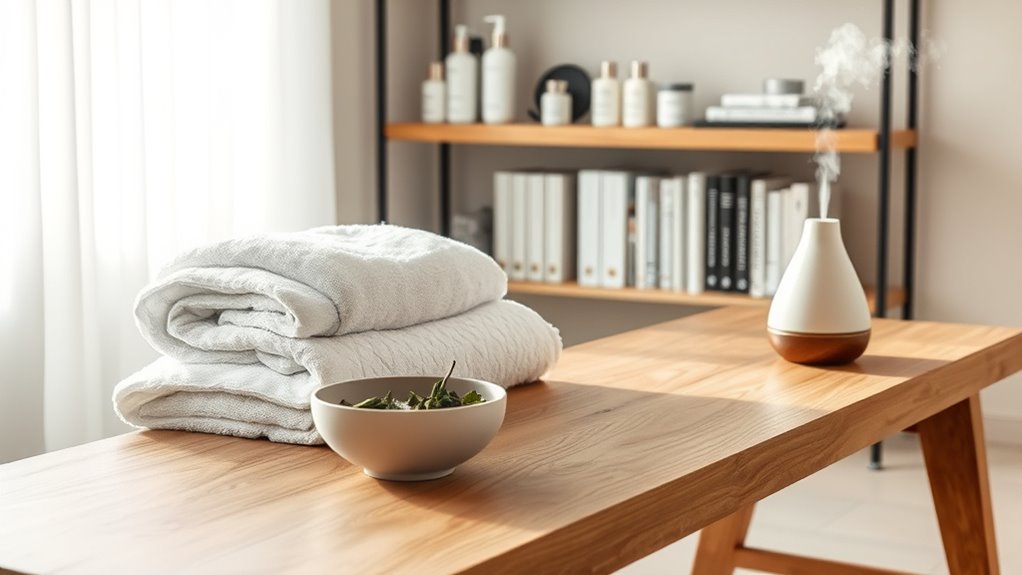Self-care has shifted from being a rare luxury or indulgence to a crucial part of daily life. Today, it’s about small, practical habits like mindful breathing and gratitude journaling that support your mental and physical health. No longer requiring big budgets or exclusive memberships, self-care is accessible and personalized. This evolution encourages you to prioritize your well-being consistently, fostering a more balanced lifestyle. To explore how self-care became an essential, keep discovering its deeper journey.
Key Takeaways
- Self-care has transitioned from a luxury activity to an essential part of overall wellness and mental health.
- Increased awareness of mental health issues has broadened self-care practices beyond superficial pampering.
- Affordable, manageable routines like mindfulness and gratitude journaling make self-care accessible to all.
- Cultural shifts promote community support and normalize conversations around mental health struggles.
- Creating relaxing environments and prioritizing well-being are now integral to living a fulfilled life.

Have you ever wondered how the concept of self-care has transformed over the years? What once was seen as a luxury or indulgence has now become an essential part of everyday life. In the past, self-care might have been limited to occasional spa visits or expensive skincare products, something you did when you had extra time or money. Today, it’s recognized as indispensable for maintaining mental health and overall wellness routines. You’re encouraged to prioritize your well-being, understanding that caring for yourself isn’t a sign of weakness but a necessary foundation for a balanced life.
Self-care has shifted from luxury to essential for mental and physical well-being.
This shift isn’t just about changing trends; it reflects a deeper understanding that mental health is just as important as physical health. You’re now more aware of how stress, anxiety, and burnout can impair your daily functioning. As a result, self-care has expanded from simple acts like taking a bath to more intentional practices that support mental resilience. Meditation, journaling, and digital detoxes are woven into wellness routines, helping you manage your emotions and clear your mind. These routines aren’t just fleeting trends—they’re evidence-based strategies that promote mental clarity and emotional stability. The focus has moved from superficial pampering to meaningful activities that nourish your mind and spirit.
The evolution also emphasizes accessibility. Self-care no longer requires a big budget or exclusive memberships; it’s about integrating small, manageable habits into your daily schedule. You might start your morning with a few minutes of mindful breathing, take short breaks during work to stretch or walk, or end the day with gratitude journaling. These small acts serve as anchors in your wellness routines, making the practice of self-care both practical and sustainable. The idea is to build a personalized routine that fits into your life, rather than forcing you into a predefined mold of what self-care “should” look like.
Moreover, the social conversation around self-care has become more inclusive and open. It’s no longer seen as a solo pursuit but as part of a collective movement toward mental health awareness. You’re encouraged to share your experiences, seek support, and normalize conversations about mental health struggles. This cultural shift has helped reduce stigma and foster a sense of community, making it easier for you to prioritize wellness routines without guilt or shame. Additionally, understanding the importance of color accuracy in visual content has reinforced that self-care extends to creating environments that promote relaxation and mental well-being. Ultimately, the evolution of self-care reflects a broader understanding that caring for yourself is fundamental to living a fulfilled, healthy life. It’s no longer a luxury but a indispensable element of your overall well-being—one that you’re empowered to make a regular, meaningful part of your routine.
Frequently Asked Questions
How Has Social Media Influenced Self-Care Trends Over the Years?
Social media has profoundly shaped your self-care trends by spreading influencer culture, making wellness routines more popular and accessible. You’re encouraged to try new products and practices through influencers’ posts. However, it also highlights the importance of a digital detox, reminding you to step back from screens and focus on genuine self-care. This balance helps you prioritize mental health while embracing the evolving self-care movement driven by social media.
What Role Does Technology Play in Modern Self-Care Practices?
In today’s world, technology gently guides your self-care journey, acting as a supportive companion. Digital wellness tools help you stay mindful, while wearable devices monitor your health, encouraging better habits. You harness these innovations effortlessly, making self-care an integrated part of your daily routine. Technology empowers you to prioritize well-being, blending convenience with awareness, so you can nurture yourself with confidence and ease every step of the way.
Are There Cultural Differences in Self-Care Perceptions Globally?
You’ll notice that cultural norms heavily influence how people perceive self-care around the world. In some cultures, traditional practices like meditation or herbal remedies are central, while others prioritize modern wellness routines. These differences shape what individuals see as essential for their well-being. By understanding these diverse perspectives, you gain a broader appreciation for self-care’s role across various societies and how it adapts to local values.
How Has the COVID-19 Pandemic Impacted Self-Care Routines?
You’re probably wondering how the pandemic changed your self-care routines. It forced you to prioritize mental health and re-evaluate work-life balance like never before. With more time at home, you started embracing daily self-care practices, realizing they’re essential, not optional. This shift helped you manage stress, stay resilient, and understand that caring for yourself isn’t a luxury—it’s a crucial part of your overall well-being.
What Are the Future Trends Expected in Self-Care Evolution?
Looking ahead, you can expect self-care to focus more on personalized wellness, tailoring routines to your unique needs. Sustainable practices will become central, encouraging eco-friendly products and mindful habits. Technology will play a bigger role, offering customized solutions and virtual health support. These trends will help you prioritize mental, physical, and emotional well-being, making self-care more accessible, effective, and aligned with your values.
Conclusion
As you embrace self-care as your anchor, remember it’s like tending to a delicate garden—you must nurture it daily to see it flourish. What once felt like a luxury now becomes your lifeline, anchoring you amidst life’s storms. By prioritizing yourself, you’re not just surviving; you’re cultivating a vibrant, resilient landscape within. Keep tending to your well-being, and watch your inner garden bloom with strength, grace, and endless possibility.










